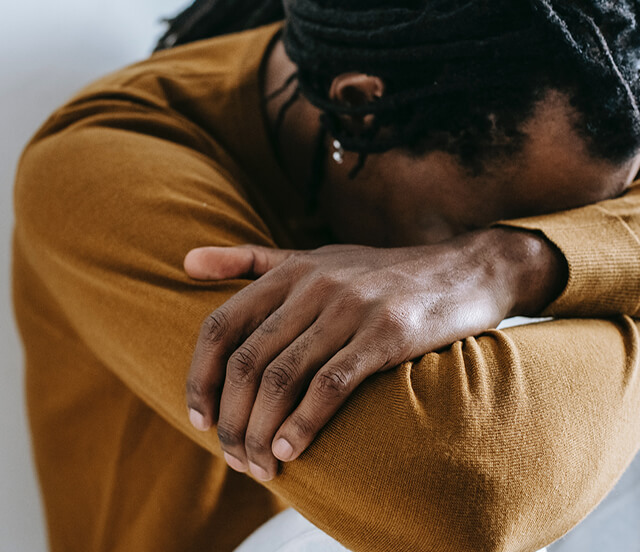by Siqhamo Yamkela Ntola
A version of this article was originally published in Fruitful Discussions June 23 2020.
Whereas a white person needs only look at a black person to understand their social standing, a black man need only look at a black woman to understand his.
The burgeoning global wave of Black Lives Matter protests following the murder of George Floyd has laid bare, once again, the untreated and festering wounds of racism on humanity’s collective moral corpus. Those of us who agonise, as a matter of ritual, from its inherently destructive nature are generally met with a callous disposition by those who have never and will never be subject to it. In contemporary South Africa, racism, with all its fervour, punctuates the lives of its black population. So significant is this evil that the founding provisions of our supreme law, the Constitution, lists “non-racism” as among the founding values of the existing dispensation. Highlighting, when invoked, an aspiring societal ethos antithetical to the frame of mind that generally governed prior to its adoption.
Ironically, in “male quarters”, particularly black men, the energy garnered and advanced for racial equality is grossly lacking for gender equality, a value listed in tandem and on par with “non-racism” in the Constitution. In this sense; how is it possible to stand in solidary with protesting African Americans following the murder of George Floyd, and generally be silent, amongst ourselves, following the recent murder of Tshegofatso Pule, the rape and murder of 14-year-old Siphiwe Sibeko and the countless women and girls abused and slain by South African men. If anything, the murder of George Floyd by a white law enforcement official portrayed racism’s attitude towards black bodies in all social precincts. Similarly, in South Africa, the same attitude prevails among black men concerning the bodies of black women.
How can it be, that as black men, we are so ignited to advance racial equality on the one hand, and dim in shouldering the advance for gender parity on the other? Evidently, we are as oppressive to women as the racist people and institutions we protest against. We have demonstrated an ability to deny women the very same humanity we assert in racially unjust spaces, and blissfully employ the same ignorance we condemn as problematic. Appropriately, we call on racist people and institutions to educate themselves on the origins of their racial privilege and harms therefrom but fail or grudgingly see the need to self-educate ourselves as men on our privilege and its harms to women. In their pleas for significant interventions to end femicide and advance gender parity, women are met, by men, with the same heartless character loathed by those protesting against racial injustice. Simply – as’nabo obubuntu sib’lwelayo, we lack the humanity we fight for.
During the first week of the COVID-19 lock down alone, 2320 complaints of gender-based violence (GBV) have been reported to the South African Police Services (SAPS). This is reportedly 37% higher than the 2019 weekly average of domestic violence cases reported to the SAPS. A change in norms and behaviour through high level prevention efforts has been identified as among the key areas for intervention by the Presidency’s Emergency Response Action Plan on Gender-Based Violence and Femicide (30 April 2020). From the onset, the Action Plan crucially notes “that violence imposed on women is not a problem of women but that of men. Young men and boys are often groomed under a patriarchal system moulding their attitudes and masculine practices that encourage dominating women and proving their manhood through violence”. Comparably, with the appropriate substitutions, the same can arguably be said about racism. Accordingly stressing the issues dominant in existing norms and behaviour in matters of race and gender equality. In a broad sense, endeavouring to aid a contribution towards a change in norms and behaviour, I deem it appropriate to draw specific attention to the ethic of ubuntu, highlighting as it pertains to gender and race one of the prevailing issues in its application – a missing bantu.
Um’ntu/Abantu
Simply put, um’ntu in Nguni languages is a “person”, with abantu being its plural form. Leaning solely on translation, um’ntu is a human being and it ought to follow, on this basis, that um’ntu is accorded their right to be human. To voyage, as I believe, from womb to tomb with dignity. Interpreted, as evidenced by historical and present-day accounts, dignity is supposedly, among others, the preserve of white people in the purview of racism and men in the purview of patriarchy, norms from whence many of our societal ills stem.
The general characterisation of black people or “bantu” in contrast to white people in contemporary South Africa is partly informed by the then legal definitions and ensuing behaviours accorded to either group by South Africa’s colonialist governments. As is known, race classification between non-white and white people became the basis for, among others, separate and inferior schooling, housing and workplace conditions for those considered non-white. Accordingly, the lived reality indicated that a white person (or European) was not a “bantu” or um’ntu and vice versa. Although generally practiced, gender formed the basis for further discrimination within this paradigm, particularly against black women. White people or Europeans were not abantu in the colonial construct and the black man’s status as a bantuwas ranked higher than that of a black woman. To paraphrase James Baldwin, whereas a white person needed only to look at a black person to understand their social standing, a black man needed only look at a black woman to understand his.
Mindful of how these characterisations have saturated modern day South Africa, the application (or lack thereof) of ubuntu as a societal ethic becomes problematic. First because integral to the ethic is being um’ntu. Although simply meaning human when translated, interpreted, the prevalent societal hierarchies informed by past racial and gender classifications protrude. In white society, this may entail the practice of an ethic emanating from a people whose race and social status has been engineered to be inferior to theirs. In black society, black men in particular, this involves undoing the patriarchal system serving as a barrier to the ethic’s full reign. In either instance, the matrix of privilege needs addressing.
Ubuntu
As a widely recognised ethic in South African society and considered the “underlying motif of the Bill of Rights” by our Constitutional Court; ubuntu as generally articulated by the ubiquitous maxim “a person is a person through other persons” extends beyond the plain English meaning associated with it. According to Thaddeus Metz, ubuntu may be interpreted as a human being genuinely living a human way of life “to the extent that she prizes identity and solidarity with other human beings”. The themes of “identity” and “solidarity” in the latter interpretation are inserted owing to being identified as recurring in “typical African discussion of the nature of community as an ideal”. This despite being identified as logically distinct. According to Metz, “[t]o identify with each other is largely for people to think of themselves as members of the same group, that is, to conceive of themselves as a ‘we’, for them to take pride or feel shame in the group’s activities, as well as for them to engage in joint projects, co-ordinating their behaviour to realise shared ends. For people to fail to identify with each other could go beyond mere alienation and involve outright division between them, that is, people not only thinking of themselves as an ‘I’ in opposition to a ‘you’, but also aiming to undermine one another’s ends. To exhibit solidarity is for people to engage in mutual aid, to act in ways that are reasonably expected to benefit each other. Solidarity is also a matter of people’s attitudes such as emotions and motives being positively oriented toward others, say, by sympathising with them and helping them for their sake. For people to fail to exhibit solidarity would be for them either to be uninterested in each other’s flourishing or, worse, to exhibit ill-will in the form of hostility and cruelty.”
Perspective
Leaning on the above formulation in considering both matters of race and gender parity, the hypocrisy, from a black man’s perspective, is indeed shameful. When it comes to women and girls, we are blinded by a similar privilege blinding the benefactors of apartheid South Africa. On the one hand, we are critical of racial injustice, citing the general lack, by white society, to identify themselves as equals to their black counterparts and how this thinking adversely manifests in public and private life. On the other hand, we generally exhibit a lack in identifying with women as equals and accordingly, visit upon them the physical, psychological and emotional trauma we detest.
Translated and properly interpreted, ubuntu and its application makes no differentiation amongst persons. An environment conducive to its full reign requires, in part, identifying the regions of our social fabric deficient in its presence and application, and nourishing them accordingly. On race and gender matters, this extends farther than an acknowledgment of privilege and the basis thereof. Among other things, it includes being mindful, in a historic and present sense of the cost of such privilege. From a race perspective, as a black man, this ought to include white society identifying itself and exhibiting solidarity with the broader black South African community. How? – is a question best answered by white society. On my privilege as a black man, identifying my buntu as on par with women and exhibiting solidarity includes, but is not limited to, constantly reviewing notions of ubudoda (manhood) and how they reinforce existing disparities which dispel our ethic of ubuntu. Integral to such review is the constant presence and voice of women, black women in particular, as my privilege robs me of understanding their reality in racist and patriarchal South Africa. Flowing from such review must be a corrected disposition which embraces the full value of women lives and vehemently opposes any conduct (from sports fields, places of work and WhatsApp groups) that seeks to undermine it.
This post and more insightful articles by Siqhamo are available on his blog fruitfuldiscusssions.com.






